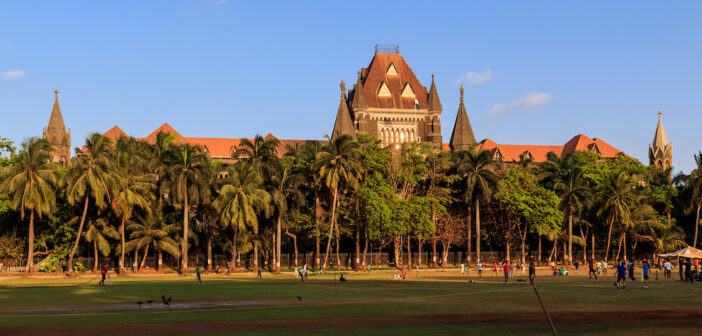In this edition of Court Judgements, we look at the Supreme Court’s judgement on benefits to temporary employees, and on termination in contractual appointment, the Allahabad High Court’s judgement on Cruelty by declining to cohabit, and the Bombay High Court’s judgements on citizenship of child, and also on cheating by a girl when eloped.
Supreme Court: The denial of pensionary benefits solely on the basis of temporary status without weighing in other circumstances is not tenable or justifiable in the eyes of the law.
In Rajkaran Singh & Ors. vs. Union of India & Ors., the Supreme Court held that mere classification of employees as ‘Temporary’ or ‘Permanent’ is not merely a matter of nomenclature, but carries significant implications, particularly in service benefits and protections. Denying pensionary benefits solely on the basis of the status of employment is not tenable or justifiable in eyes of law.
The two-judge bench of the apex court comprising Justice Hima Kohli and Justice Sandeep Mehta was hearing an appeal against the Delhi High Court’s judgement that dismissed the appellant’s petition against the Tribunal’s order that rejected the appellants’ claim for benefits of the replacement scales of the Revised Pay Rules, 2008, in accordance with 6th Pay Commission Report. The brief facts of the case are as follows:
The appellants were appointed to various roles, such as Junior Accountant, Accountant, Upper Division Clerk (UDC), and Lower Division Clerk (LDC), to manage the Compulsory Saving Scheme Deposits (SSD) Fund of the Special Frontier Force (SFF). While employed in these positions, the appellants received salary and benefits, including Traveling Allowance (TA), Dearness Allowance (DA), House Rent Allowance (HRA), Special Security Allowance (SSA), Gratuity, Bonus, Winter Allowance, and High-Altitude Allowance, in accordance with the 4th and 5th Central Pay Commissions (CPC). On 01 January 2006, the Union of India implemented the 6th Central Pay Commission, extending its benefits to all SFF government employees. However, these benefits were not granted to the SSD employees (the appellants), who instead received an ad-hoc amount of Rs. 3,000 per month. Aggrieved by this, the appellants appealed to the Union Government for the extension of the 6th Pay Commission benefits, but their request was denied. Subsequently, they approached the Central Administrative Tribunal (CAT) seeking these benefits, but their application was also rejected, ruling that although SFF troops are government servants, the Tribunal held that this status did not extend to the appellants.
The Counsel for the appellants argued that the appellants had served for over three decades and were treated similarly to regular government employees in terms of pay, increments, promotions, and other benefits. The appellants contended that they should receive the same benefits as regular government employees, invoking the principle of “equal pay for equal work” as derived from Article 39 of the Constitution of India.
The apex court, having heard both submissions of both parties, looked at whether a corporation could be considered an instrumentality of the state, the principles laid down therein provide valuable guidance in assessing the nature of employee-employer relationships. Based on its judgement in Ajay Hasia and Others vs. Khalid Mujib Sehravardi and Others, where it highlighted certain factors to consider:

Relying on this and Pradeep Kumar Biswas vs. Indian Institute of Chemical Biology and Others, the apex court concluded that the appellants meet the characteristics of regular government servants. During their service, the appellants received increments and promotions comparable to those of other government employees. This pattern of career progression mirrors that of regular government servants and suggests a deep and pervasive governmental control over their employment terms. Further, as held in Vinod Kumar and Others vs. Union of India, the essence of employment and the rights thereof cannot be merely determined by the initial terms of appointment when the actual course of employment has evolved significantly over time. The court accepts that the appellants were treated as equivalent to regular government employees. Accordingly, it is held that any denial of pensionary benefits solely on the basis of their temporary status is violative of the Constitution of India.

Accordingly, the appeals are allowed, and the respondents are directed to extend the benefits of the 6th Central Pay Commission including the pensionary benefits under the Revised Pay Scale Rules, 2008.
Supreme Court: Order of termination, even if on a contractual basis, must follow the Principles of Natural Justice.
In UPSRTC & Ors. vs. V. Brijesh Kumar & Anr., the apex court held that when the termination order of a contractual employee is apparently stigmatic in nature, it must follow the principles of natural justice.
The two-judge bench comprising Justice PS Narasimha and Justice Pankaj Mithal was hearing an appeal by the Uttar Pradesh State Road Transport Corporation (UPSRTC) against the Allahabad High Court’s judgement that set aside the termination order of the respondent passed by the Assistant Regional Manager, Mathura, UPSRTC. The brief facts of the case are as follows.
The respondent, Brijesh Kumar, whose father was a regular conductor with the Uttar Pradesh State Road Transport Corporation (UPSRTC) and died in service on 18 October 2003, was a minor at the time of his father’s death. His mother initially applied for a compassionate appointment for him but received no response. After Brijesh reached the age of majority and completed his education, his mother reapplied under the Uttar Pradesh Recruitment of Dependants of Government Servants Dying in Harness Rules, 1974. Eventually, in 2012, the UPSRTC offered him a position as a contract conductor on a preferential basis, and he joined after depositing a security amount.
However, during his service, Brijesh was found guilty of misconduct for carrying passengers without tickets and extra luggage without booking, leading to his termination on 30 January 2016. Brijesh challenged this termination, claiming that as a compassionate appointee, he was a permanent employee and should not have been dismissed without a disciplinary inquiry. The High Court agreed, ruling that his appointment was indeed on a compassionate basis, making him a permanent employee and that his services could not be terminated for misconduct without due process. The current appeal is against this judgment.
The counsel for the UPSRTC argued that since the appointment was on a contractual basis, his services have rightly been determined on the alleged misconduct. The counsel for the respondent argued that compassionate appointments are always of permanent nature and the services of such employees cannot be terminated without holding a disciplinary inquiry.
Upon hearing both sides, the apex court held that there is no dispute to the legal proposition that any appointment made on a compassionate basis is in the nature of a permanent appointment and is not liable to be treated as temporary or contractual. The only question is whether the appointment of the respondent is under the Dying in Harness Rules or is independent of it on a contractual basis.
Upon examining the records, the court found that the respondent was appointed as a contract conductor on a preferential basis being the son of the deceased employee. He was not appointed on a compassionate basis.
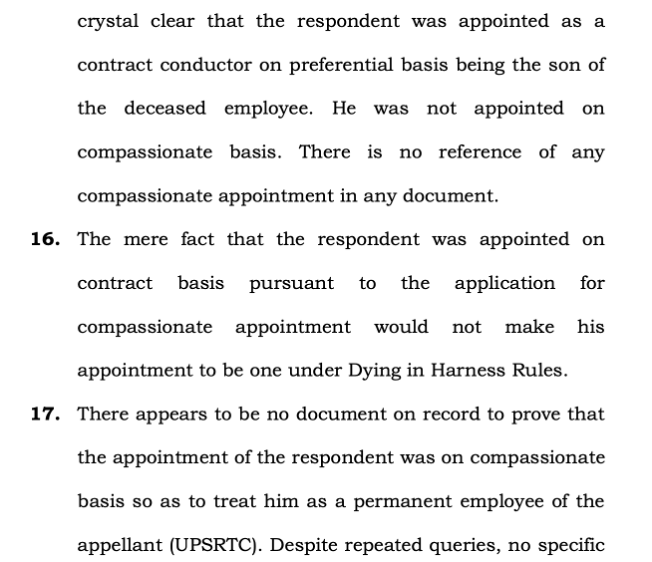
The apex court held that the High Court erred in misinterpreting the materials on record, and incorrectly ruled that the respondent’s appointment was on a compassionate basis, classifying him as a permanent employee under the Dying in Harness Rules, which was not the case.
However, since the termination order was issued without conducting a formal inquiry, a show-cause notice or a chance to be heard, it did not follow the principles of natural justice.

Therefore, the court ruled that the judgement of Allahabad High Court is set aside to the extent that they hold the appointment to be on a compassionate basis under the Dying in Harness Rules and that of a permanent nature but quashing of the termination order is maintained.
Bombay HC: A child cannot be left ‘stateless’, acquisition of foreign nationality by mother does not affect citizenship of the child.
The Bombay High Court, in Chrisella Valanka Kushi Raj Naidu vs. Ministry of External Affairs, held that a child cannot be denied Indian citizenship solely on the basis that their single parent is a foreign national.
The division bench of Bombay High Court, comprising Justice Makarand Karnik and Justice Valmiki SA Menezes was hearing a petition seeking the quash the decision of the High Commission of India in the United Kingdom holding that the petitioner is not eligible for a passport.
The brief facts of the case are as follows. The petitioner, a 16-year-old child, has filed a petition through her mother, who has been granted permanent custody by a Civil Court order. Despite this, the respondents denied the petitioner an Indian passport, citing that she is a “single parent minor child” and that physical custody is with a foreign national parent. The petitioner, born on 27 October 2007, in Margao, Goa, was issued an Indian passport in 2014, which expired in December 2019. Her mother, who acquired Portuguese citizenship and a Portuguese passport in 2015, subsequently took employment abroad. The petitioner, who has never applied for citizenship in another country and continues to hold Indian citizenship, travelled to the UK with her mother and was granted “Indefinite Leave in the United Kingdom” by the UK Home Office, which requires that the petitioner can only re-enter the United Kingdom by presenting her passport. The petitioner’s mother’s visa in the UK is valid until September 2024. The petitioner’s counsel argued that the denial of the passport renewal based on her mother’s foreign nationality is inconsistent with the Passport Act, 1967, and that it infringes on her fundamental right to travel.
Considering the relevant provisions of the Passport Act, 1967 and Citizenship Amendment Act, 2003, the Bombay High Court held that at the time of the petitioner’s birth, her parents were both Indian citizens, as per sub-section (1)(c)(i) of Section 3 of the Citizenship Act, 1955. Additionally, according to sub-section (1)(c)(ii) of Section 3, the petitioner is entitled to Indian citizenship because her father was an Indian citizen, and her mother was not an illegal migrant.

Further, the reasoning behind the refusal to issue a passport does not qualify under the grounds to refuse to issue a passport or travel document for visiting any foreign country under clause (c) of sub-section (2) of section 5 of the Passport Act.
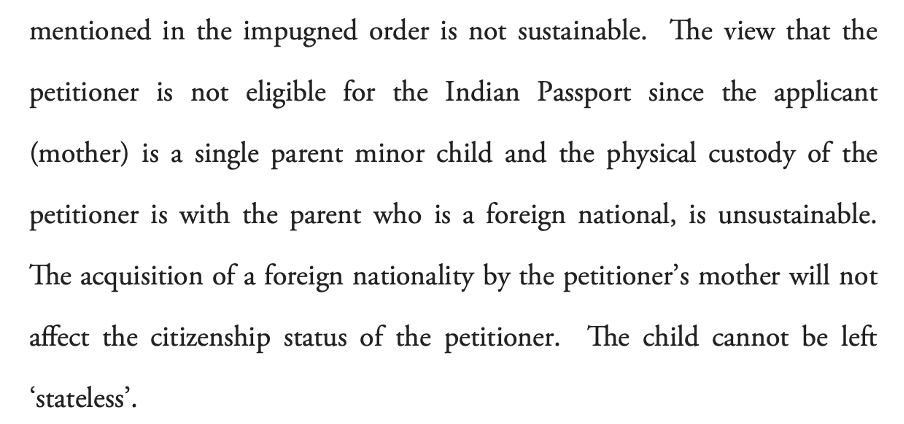
Accordingly, the Bombay High Court held that the petitioner is entitled to be issued a passport on the basis of her Indian citizenship.
Bombay HC: To attract the offence of cheating, the intention to cheat or deceive should be right there from the beginning.
In ADP vs. State of Maharashtra, the Bombay High Court held that to establish an offence of cheating, there must be evidence of intent to cheat or deceive from the outset. This intention must be present from the very beginning of the act or transaction in question.
The two-judge bench comprising Justice Neela Gokhale and Justice A.S. Gadkari was hearing an application seeking the quashing of FIR proceedings for offences punishable under Sections 417, 418, 420, 500 read with 34 of the Indian Penal Code, 1860.
The brief facts of the case are as follows. According to the FIR, Dhanajay Bhosale (Respondent No.2) was seeking a suitable partner for his son, Amol, and was introduced to the Applicants through mutual friends and matchmakers, Mr. Ashok B. Sonawane and Mr. Vijay Ovhal. In March 2022, Respondent No. 2 and his family proposed their son’s marriage to the Applicants’ daughter. After mutual agreement, the engagement ceremony (“Supari Ceremony”) took place on 27 March 2022, with the mediators present to confirm the approval of both families. The marriage was scheduled for 1 May 2022, and both families began preparations. Respondent No. 2 claims to have spent Rs. 1,62,000 on wedding preparations, including jewellery, a trousseau, and gifts. However, on 29 April 2022, the Applicants informed Respondent No. 2 that their daughter had been missing since 28 April 2022, and a missing person complaint had been filed. Respondent No. 2 alleges that the Applicants concealed their daughter’s affair with another individual, leading him and his family to incur significant expenses under false pretences. He claims that this deceit defamed his family and filed the FIR against the Applicants. The counsel for applicants argued that they did not have any intention to cheat, defraud or defame Respondent No.2. There was no motive or purposeful intention of committing the offences as alleged and no charges can be framed against the Applicants.
Upon hearing both parties and looking at the materials and records of the case, the court finds that there is no evidence indicating that the Applicants engaged in any dishonesty or deception to induce Respondent No. 2 to spend money or lure his son, Amol, into the marriage with Applicant No. 4.
The High Court relied on the Apex Court’s judgement in Prof. R.K. Vijayasarathy and Another vs. Sudha Seetharam and Anr, which culled out the ingredients to constitute the offence under Sections 415 and 420 of IPC.
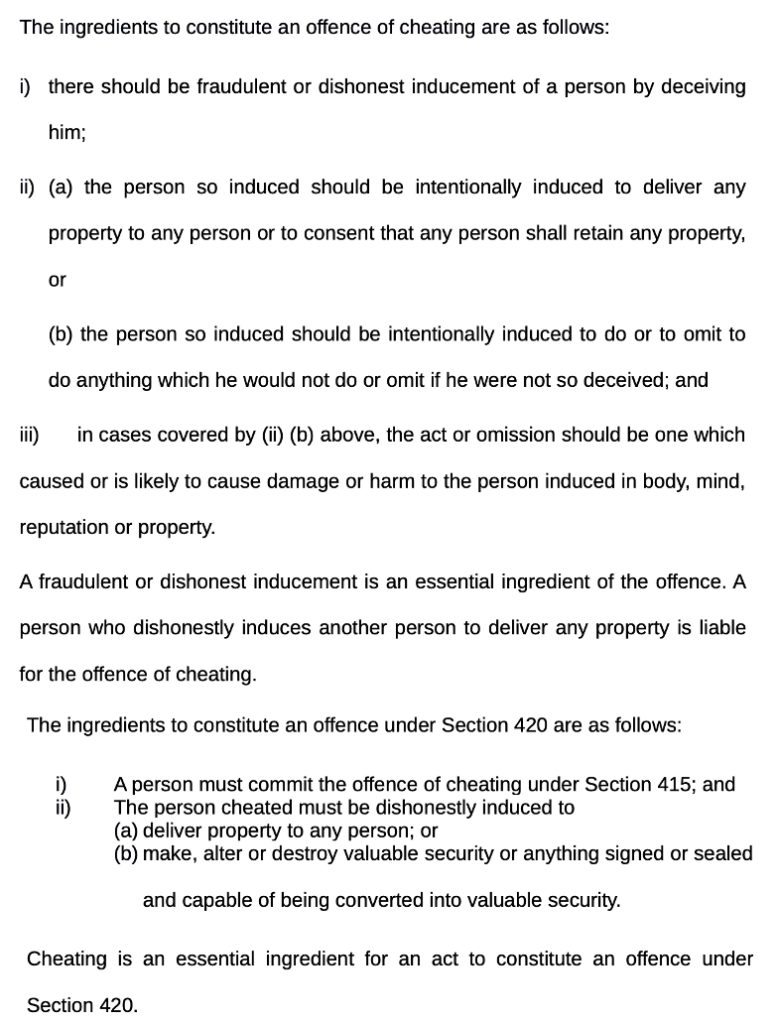
The court held that the facts in the present case prima facie do not disclose the commission of the cognizable offence of ‘cheating’. This is a case concerning a young woman who initially agreed to marry Amol as per her parents’ decision but later hesitated at the last moment, unwilling to enter into what she perceived as a facade of a marriage. Her reluctance to disclose her relationship to her parents does not constitute ‘cheating’ under the IPC nor justify criminal prosecution. Her decision to remain silent might be seen as unwise but not deceitful. For an offence of cheating to be established, there must be evidence of intent to deceive from the outset. In this case, the complaint from Respondent No. 2 does not demonstrate any such intention to deceive from the beginning.
Accordingly, the criminal proceedings are quashed and set aside.
Allahabad HC: Declining to cohabit depriving the partner of his/her conjugal rights amounts to cruelty.
In Jitendra Kumar Srivastava vs. Smt. Sweta Srivastava, the Allahabad High Court held that if the wife refuses to live with her husband and insists on him staying in a separate room, this denial of conjugal rights can negatively affect his mental and physical well-being. Such behaviour constitutes both physical and mental cruelty.
The two-judge bench comprising Justice Rajan Roy and Justice Subhash Vidyarthi was hearing an appeal against the order of VI Additional Principal Judge, Family Court, Lucknow that rejected the petition for divorce under section 13 of the Hindu Marriage Act, 1955.
The parties married on 23 November 2016, in Lucknow. This was the first marriage for the defendant-respondent (wife) and the second for the appellant (husband). Initially, their relationship was normal for about 4-5 months, after which the respondent began harassing the appellant. She would abuse him, threaten to leave, and create conflicts whenever friends or relatives visited, even damaging household goods. She forced the appellant to live in a separate room, threatening suicide and legal action against his family if he entered her room. The respondent, who works as a receptionist at a private hospital in Lucknow, refused to settle during mediation and declined to live with the appellant, continuing to insult and threaten him in front of others.
When an application for divorce was filed before the Family Court, it rejected the petition. The Family Court observed that the documents provided by the plaintiff indicated a history of disputes with his first wife, which ended in divorce. Although the plaintiff claimed that the defendant frequently expressed a desire for a divorce, it was the plaintiff who initiated the divorce proceedings. The plaintiff failed to provide specific details about the defendant’s threats and did not present evidence that such incidents were persistent, suggesting that such occurrences could be typical of marital conflicts.
The High Court framed two issues to determine in the present case:

Looking at the material facts of the case, The High Court pointed out that the defendant stopped fulfilling her matrimonial obligations just five months after the marriage, and this neglect persisted for five years. The plaintiff has clearly stated that the defendant refused to allow him into her room and declined cohabitation, demonstrating a continuous pattern of cruelty. This behaviour indicates that the defendant abandoned the matrimonial relationship, and whether she resided in the plaintiff’s house or elsewhere as examined by Family Court is irrelevant.
The High Court also remarked that the Family Court erred by being influenced by the fact that the plaintiff’s previous marriage ended in divorce. Since that divorce was by mutual consent and the defendant did not make any allegations against the plaintiff, the Family Court should not have used the previous marriage’s failure to prejudice the current case. Additionally, the Family Court incorrectly dismissed the testimony of the plaintiff’s father, solely because he was a family member, overlooking the fact that family members are natural witnesses to domestic events. The plaintiff’s testimony was unchallenged, and the Family Court failed to recognize that civil cases are decided based on the preponderance of probabilities, not the higher standard of proof beyond reasonable doubt required in criminal cases.
Relying on the Apex Court’s judgement in Parveen Mehta vs. Inderjit Mehta, which explained cruelty under section 13 of the HMA, 1955,
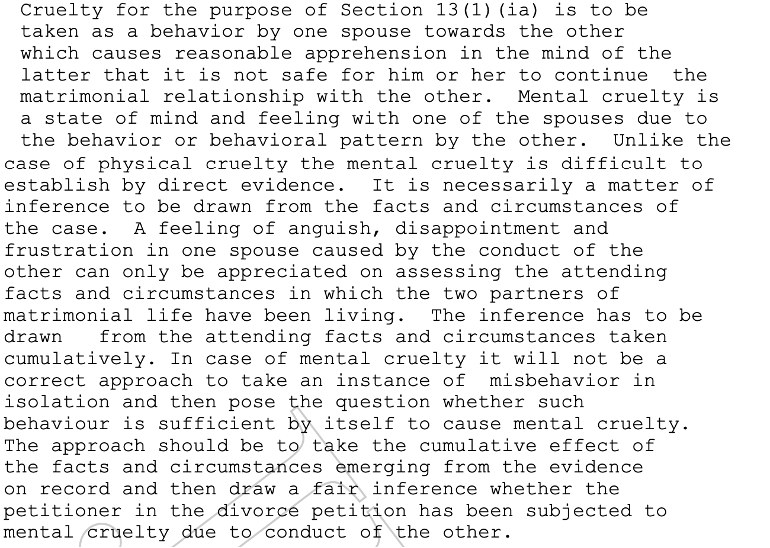
the Allahabad High Court remarked that there was sufficient evidence to substantiate the grounds of cruelty claimed by the plaintiff-appellant, justifying the grant of a divorce decree.
Accordingly, the Family Court’s order is set aside, and the decree of divorce is granted.


